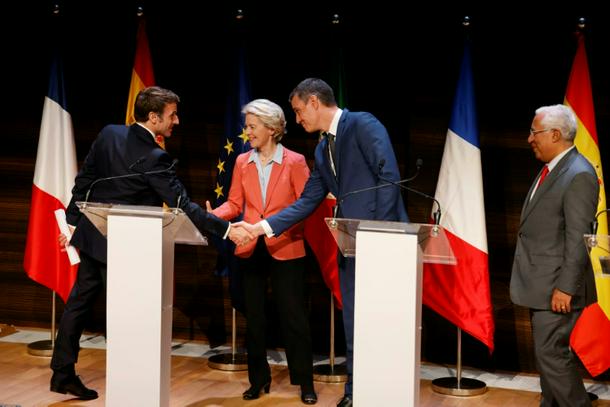
The H2Med project comes as Europe is scrambling to reduce its dependence on Russian energy following Moscow's invasion of Ukraine
Alicante (Spain) (AFP) - An ambitious underwater pipeline to bring green hydrogen from the Iberian Peninsula to the rest of Europe will be completed by 2030 and will cost some 2.5 billion euros, the leaders of France, Spain and Portugal said Friday.
The H2Med project comes as Europe is scrambling to reduce its dependence on Russian energy following Moscow’s invasion of Ukraine.
It is also seen as helping Europe transition away from fossil fuels to cleaner energy.
The pipeline between Barcelona and Marseille – also known as BarMar – will carry two million tonnes of hydrogen per year, or 10 percent of European consumption, once it goes online, said Spanish Prime Minister Pedro Sanchez.
“It is going to be the first major hydrogen corridor in the European Union,” Sanchez said.
The project will cost around 2.5 billion euros ($2.6 billion), he said at a joint press conference with French President Emmanuel Macron and Portuguese Prime Minister Antonio Costa.
The three leaders formally signed off on the plans in the presence of EU Commission chief Ursula Von der Leyen on the sidelines of a regional EU summit.
Following the talks, they released a roadmap and timeline for completing H2Med which they hope will be partially covered by European funds.
The pipeline under the Mediterranean Sea will carry green hydrogen, which is made from water via electrolysis in a process using renewable energy.
The roadmap detailed three options for the route of the pipeline, with the preferred one stretching 455 kilometres (282 miles) at a maximum depth of 2,600 metres.
Construction would begin in 2025 and last four years and eight months, it said.
- Cleaner energy -
H2Med aims to boost the decarbonisation of European industry, giving it large-scale access to clean energy from Spain and Portugal, which are hoping to become world leaders in green hydrogen thanks to their numerous wind and solar power farms.
“The focus of H2 demand is on sectors that are difficult to decarbonise, such as industry and transport,” the roadmap said.
“The cost of H2 transmission by pipeline over long distances is 2 to 4 times lower than transmitting electricity over high-voltage lines,” it said.
Announced at an EU summit in October, the pipeline offers an alternative to the defunct 2003 MidCat pipeline project which was to have carried gas across the Pyrenees from Spain to France.
It was abandoned in 2019 over profitability issues and objections from Paris and environmentalists.
Initially, the idea was for the pipeline to carry gas from the Iberian peninsula to central Europe, given Spain and Portugal’s huge capacity for turning liquefied natural gas (LNG) that arrives in tankers back into gas form.
But Portuguese Prime minister Antonio Costa stressed that the pipeline would only carry green hydrogen.
The meeting took place just before a EuroMed 9 summit which groups Croatia, Cyprus, France, Greece, Italy, Malta, Portugal, Slovenia and Spain
Spain’s Sanchez had planned to hold bilateral talks with Italy’s new far-right Prime Minister Giorgia Meloni, but she pulled out due to illness early on Friday, Rome said.